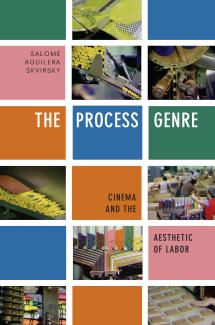
Biography

Salomé Aguilera Skvirsky works on transnational political cinema, with a special focus on Latin America. She takes a comparativist and broadly hemispheric approach to the representation of race, labor, and “the people” in moving image media. Her essays have appeared in Cinema Journal, the Journal of Latin American Cultural Studies, Social Identities, Hispanófila, and in The Routledge Companion to Latin American Cinema. She is a co-editor at Critical Inquiry.
Her first book, The Process Genre: Cinema and the Aesthetic of Labor (Duke University Press, 2020), won the 2021 Best First Book Prize from the Society for Cinema and Media Studies; it was a Finalist in the “Media and Cultural Studies” category for the 2021 PROSE Book Awards presented by the Association of American Publishers, and it was shortlisted for 2021 Kraszna-Krausz Moving Image Book Award. The Process Genre introduces and theorizes a hitherto unrecognized transmedial genre that she calls “the process genre.” The process genre, she argues, may be seen across the history of cinema and in multiple national contexts. Indeed, the process genre is ubiquitous in the contemporary mediascape, with examples that range from Ikea assembly guides to internet “hands-and-pans” videos to Mister Rogers’ iconic video, “How people make crayons,” to Bob Ross’s painting tutorials. As these examples suggest, the process genre is characterized by the representation of processes that are shown in a special, often mesmerizing fashion. These processes are typically processes of production—both artisanal and industrial—and, crucially, are represented as having a chronologically ordered series of steps with a clearly identifiable beginning, middle, and end. The book argues that while the process genre’s first exemplars emerge in the early modern period with how-to manuals, technical machine drawings, and what E. H. Gombrich called “pictorial instructions,” it is in the medium of cinema that the process genre achieves its most impressive and characteristic results. Across the history of cinema, the process film is well represented in nonfiction categories such as the industrial film, the educational film, and the ethnographic film—as well as in art cinema. The Process Genre proposes that the broader cultural significance of the process genre is in its formal approach to the representation of labor, which—regardless of the actual kind of labor being depicted—it casts as skilled and artisanal. As a result, the exemplars of the process genre often stake out ideological positions from across the political spectrum on the meaning of labor in human life.
Skvirsky is currently pursuing a book-length project, “Filming the Police,” which is a comparativist treatment of the topic of police on screens that brings together the ubiquity of police shows in televisual media with the surveillant and sousveillant recordings of police violence in the digital age.
Articles & Chapters
“The Latin American Process Film.” In Films that Work Harder II, edited by Vinzenz Hediger, Florian Hoof, and Yvonne Zimmermann. Amsterdam University Press. Forthcoming 2022.
“On the Talking Head and Las muertes chiquitas.” In On Women’s Films: Across Worlds and Generations, eds. Ivone Margulies and Jeremi Szaniawski, 125-146. London: Bloomsbury, 2019.
“Realism, Documentary and the Process Genre in Early New Latin American Cinema.” In The Routledge Companion to Latin American Cinemas, edited by Laura Podalsky, Ana Lopez, Marvin D’Lugo, 119-132. London: Routledge, 2017.
“Las cargas de la representación: Notas sobre la raza y la representacíon en el cine latinoamericano [The Burdens of Representation: Notes on Race and Representation in Latin American Cinema].” In Special issue of Hispanófila, vademécum del cine iberoamericano, edited by Kathy Everly, Samuel Amago, Eugenia Afinoguenova, volume 177 (June 2016): 137-154.
“The Postcolonial City Symphony Film and the ‘Ruins’ of Suite Habana.” In Special Issue of Social Identities: Journal for the Study of Race, Nation and Culture, edited by edited by Kristi Wilson and Antonio Traverso, volume 19, nos. 3-4 (2013): 423-439.
“Quilombo and Utopia: The Aesthetic of Labor in Linduarte Noronha’s Aruanda(1960).” Journal of Latin American Cultural Studies, volume 20, number 3 (2011): 233-260.
“The Price of Heaven: Remaking Politics in All that Heaven Allows, Ali: Fear Eats the Soul, and Far from Heaven.” Cinema Journal, volume 47, number 3 (2008): 90-121.
Teaching
Autumn Quarter 2024
CMST 40000 Methods and Issues in Cinema Studies
Winter Quarter 2025
CMST 14400 Film and the Moving Image
CMST 21804 Latin American Documentary
Previously taught courses include: Latin American Documentary (CMST 23906), Filming the Police (CMST 27005 / 37005), Advanced Seminar - Winter: Filming the Police (CMST 29203), Cinema/Labor (CMST 67404), Economic Objects: Capitalism as Medium (CMST 27821 / 37821), Methods and Issues (CMST 40000), Law and Order: Police and Procedure on the Global Screen (CMST 27007 / 37007), Film and the Moving Image (CMST 14400), Intensive Track - Written Thesis Workshop (CMST 27299)
